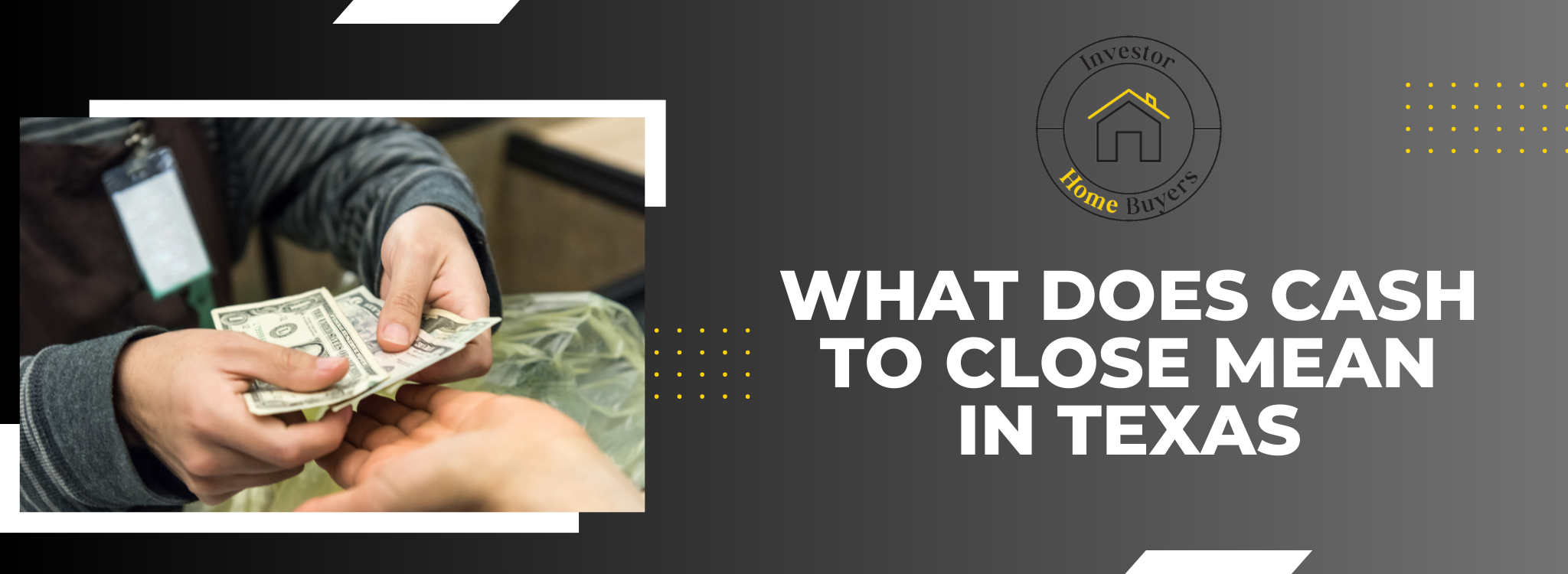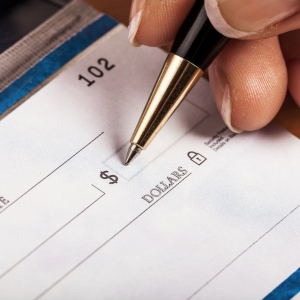
Understanding The Concept Of “Cash To Close”
One phrase that might frequently generate uncertainty while shopping for a Texas house is “cash to close.” This is the sum a buyer must provide to the closing table to finish the sale.
It covers not only the down payment but also any other fees and expenses such as loan fees, closing charges, prepayment taxes, and insurance.
A seamless closing depends on an awareness of the cash to close idea, which guarantees that buyers are financially ready for their new house and helps to avoid any last-minute surprises.
To properly grasp this crucial component of the house-buying process, you should carefully go over all the material your lender and real estate agent sent.
Table Of Contents
- Understanding The Concept Of “Cash To Close”
- Demystifying Cash To Close: A Comprehensive Guide
- Key Takeaways On Cash To Close For Homebuyers
- Calculating Cash To Close: Tips And Tricks
- How To Pay For Your Cash To Close Expenses
- Exploring The Meaning Of “Cash to Close”
- The Crucial Differences Between Cash To Close And Closing Costs
- Unpacking The Components Of “Cash to Close” Payments
- Estimating Your Required Cash Amount At Closing
- Debunking The Myth: Do You Really Need Physical Cash At Closing?
- Recent Posts On Cash To Close: Stay Updated And Informed
- Quick Links For Simplified Understanding Of Cash To Close
- Setting Your Home Goals? Don’t Forget About Cash To Close!
- Is Cash To Close The Same As Down Payment?
- What Does Close To Cash Mean?
- How Much Are Closing Costs In Texas If Paying Cash?
- Is The Estimated Cash To Close Accurate?
Demystifying Cash To Close: A Comprehensive Guide

When buying a house in Texas, it’s important to understand what “cash to close” means. For a buyer, this is the total amount of money they need to bring to the closing table in order to buy the house.
Potential buyers should fully comprehend what this includes and how it is figured so that there are no unpleasant surprises during the closing process. There are fees like appraisal, title insurance, and loan fees that are added to the cash to close.
At closing, you may also have to pay for things like property taxes and interest that were paid beforehand. By clearing up the mystery of cash to close and fully comprehending all the parts involved, buyers can guarantee a quick and successful closing on their Texas property purchase.
Key Takeaways On Cash To Close For Homebuyers
If you want to buy a house in Texas, you need to understand what “cash to close” means. In this case, the amount of money a buyer has to pay at closing includes the down payment as well as other costs and fees like appraisal fees, title insurance, and loan application fees.
Buyers need to carefully read their loan estimate and closing disclosure papers to get a clear picture of how much cash they will need to close. Buyers should also know that things like seller concessions or lender credits may be changeable and could change the amount of cash they need to close.
If homebuyers know about these important things, they can confidently go through the cash to close process and make sure the deal goes smoothly.
Calculating Cash To Close: Tips And Tricks

In Texas, one of the most important things to think about when finishing on a real estate deal is how much cash you will need. This amount is called “cash to close,” and it includes all the costs and fees that come with buying or selling a home.
There are a few things you should remember to help you figure out your cash to close correctly. For starters, make sure you read your lender’s loan estimate and closing disclosure papers very carefully.
These will list all of the costs connected with the deal. You should also know that some fees might be able to be negotiated, so don’t be afraid to talk about them with your banker or real estate agent.
Also, make sure you know exactly how much your down payment is and how any credits or seller concessions might change your cash to close. Following these tips and tricks will help the closing go smoothly and keep you from getting any nasty financial shocks.
How To Pay For Your Cash To Close Expenses
The idea of “cash to close” is one of the most important things to know about buying a house in Texas. What this means is how much cash a buyer needs to pay for the closing costs on a house. Costs like the down payment, appraisal fees, title insurance, and other closing costs can be part of this group.
It’s important to know how to pay for your cash to close costs so that the closing goes smoothly. There are many ways to do this, such as using funds, getting a cashier’s check or wire transfer, or even asking the seller to help pay the closing costs.
Before buying or selling a home in Texas, you need to make sure you know exactly what these costs are and how you’re going to pay for them.
Exploring The Meaning Of “Cash To Close”

In Texas, the phrase “cash to close” can be hard to understand when it comes to finishing on a real estate deal. This is the amount of cash a buyer needs to bring to the deal in order to go through with it.
It includes the down payment plus any other costs and fees, like taxes, insurance, and closing costs.
Figuring out how these costs are broken down and how they affect the total amount of cash needed to close can help make this part of the process less confusing.
Knowing what this number includes can help buyers be better prepared for a smooth and successful close on their Texas home purchase.
The Crucial Differences Between Cash To Close And Closing Costs
Understanding the money side of getting a house in Texas is very important. A common thing that makes homebuyers confused is the difference between “closing costs” and “cash to close.”
Some people may use these terms interchangeably, but there are important differences between them that all buyers should know about so that the close goes smoothly. The term “cash to close” refers to the full amount of money needed to finish the deal, which includes the down payment, loan fees, and any other immediate costs.
Although, closing costs include things like appraisal fees, title insurance, and attorney fees that are needed to complete the real estate deal. Informed buyers can make better budget choices and avoid unpleasant shocks at the closing table by understanding these differences.
Unpacking The Components Of “Cash to Close” Payments

When you buy a house in Texas, you may hear the phrase “cash to close,” which can be hard to understand. But knowing what this payment consists of is important for a smooth closing process.
To close, a buyer must bring a certain amount of cash. This amount is called “cash to close.” This includes a down payment, closing costs, and costs that have already been paid, like property taxes and homeowner’s insurance.
It is important to keep in mind that cash to close can change based on the type of loan and other facts. Buyers can be better prepared for a successful Texas real estate deal if they break down each part of this payment.
Estimating Your Required Cash Amount At Closing
One of the most important things to know when buying a house in Texas is how much cash you need to close. This is the amount of cash a buyer needs to bring to the closing table in order to finally buy something.
It can be hard to guess how much cash you will need at closing, but you can do it if you know what you’re doing and plan ahead. First, you’ll need to think about the down payment, which is usually 20% of the total price of the house.
There are also costs like property taxes, closing costs, and title insurance that need to be thought about. Please keep in mind that these costs might be different based on the type of loan and where the property is located.
By carefully calculating and planning for these costs, you can ensure that the closing process for your Texas real estate deal goes smoothly.
Debunking The Myth: Do You Really Need Physical Cash At Closing?

For people in Texas who are buying or selling a home, the phrase “cash to close” can mean different things. Not always, but often, people think that they need cash to close a deal.
Really, an electronic funds transfer or a cashier’s check can be used for almost any purchase. The phrase “cash to close” just means the amount of money needed to pay for all the fees and costs related to the closing.
Payoffs, assessment fees, title insurance, and down payments are some of the things that can meet this criteria. To avoid extra stress and misunderstanding during the closing process, buyers and sellers should learn about this myth and show how it is false.
Recent Posts On Cash To Close: Stay Updated And Informed
Paying cash at closing is a necessary part of the real estate process, but it can be hard to understand and cause stress for both buyers and sellers. Accordingly, it’s important to know about any new developments or changes to the Texas cash to close standards.
Many costs are involved, like down payments, loan fees, and escrow deposits. This also includes knowing about any closing costs that might come up during the last few steps of the deal.
By staying up-to-date and informed, both parties can make sure the close goes smoothly and avoid any surprises or delays.
Quick Links For Simplified Understanding Of Cash To Close

It’s important to know about the cash to close when you’re buying a house in Texas. When a buyer comes to the closing table, this is how much money they need to finish the deal.
These tools break down down down payments, closing costs, and expenses that have already been paid for. By getting to know these important features, you can ensure the closing goes smoothly, and there are no shocks on the big day.
When buying a home in Texas, buyers need to know what they’re doing and be ready whenever they need cash to close.
Setting Your Home Goals? Don’t Forget About Cash To Close!
There are a lot of things to think about when buying a house in Texas so that the deal goes smoothly. Cash to close is an important factor that is often forgotten.
That’s how much cash sellers need to bring to the closing table along with their down payment. It has things like escrow fees, closing costs, and bills that have already been paid for.
Buyers need to be clear about their goals and make a budget that fits them, remembering to include the money they’ll need for closing. If sellers know and plan for cash to close, they can avoid any surprises at the last minute and make sure the real estate deal goes smoothly.
Is Cash To Close The Same As Down Payment?
If you are not well-versed in the financial aspects of the transaction, purchasing a home in Texas might be challenging. The distinction between a down payment and cash to close is one that frequently causes confusion.
Both require you to pay money upfront, but they are used for different things in the real estate process. When you have “cash to close,” you have all the money you need to pay for the closing costs, which include things like appraisal, title insurance, and loan fees.
If you make a down payment, on the other hand, you put some of the total cost of the house toward the down payment. It is very important for buyers to understand these differences so that there are no shocks at closing and the real estate deal goes smoothly.
What Does Close To Cash Mean?

For a Texas real estate closing to go smoothly, you need to understand what it means to “close to cash.”
For lack of a better word, “close to cash” means having enough money to pay for the down payment, closing costs, and any other fees or costs that come with buying a house.
This sum should be fully known to you before you sign a real estate contract, as it may vary depending on the kind of property and its location.
People who buy homes can avoid shocks and ensure the closing process goes smoothly by understanding what “close to cash” really means and being ready for all the financial parts of the deal.
How Much Are Closing Costs In Texas If Paying Cash?
One of the most important things for cash buyers in Texas who want to buy a home is knowing how much the closing costs will be. These costs may be different based on things like the value of the property, where it is located, and the type of transaction.
It is crucial to remember that even though Texas does not have a state-mandated transfer tax, the cash to close amount may still contain a variety of extra costs. A few examples include registration costs, appraisal fees, and title insurance.
It’s important to work closely with your real estate agent and lender to get a good quote. This will help the closing go smoothly and keep you from being surprised.
Is The Estimated Cash To Close Accurate?
One thing that Texas home buyers worry about a lot is how accurate the expected cash to close number is. With all the costs and fees that come with buying a house, it’s important to know exactly how much money you’ll need to finish the deal.
But for first-time buyers, this amount can be hard to understand and handle. That’s why it’s important to take the mystery out of the idea of “cash to close” and spell out exactly what goes into this final number.
By knowing how the costs are broken down and what changes might be made, buyers can ensure the closing goes smoothly, and there are no surprises on closing day.
Read on to learn more about how to sell a house in Texas. These findings apply all over Texas, including Fort Worth, Austin, El Paso and nearby areas. For more help, contact us at (214) 253-4544.
Resources To Help You Sell A House in Texas
| LOANS | CHECKS | COUNTER-CHECK | PERSONAL CHECKS | MORTGAGE LOAN | MORTGAGE |
| MORTGAGE INTEREST | HOMEBUYING | MORTGAGE LENDER | CREDIT CARD | SALES | INSURANCE PREMIUMS |
| PREMIUM | BANK | EARNEST MONEY | CASHIER’S CHECK | LAWYERS | EXPERTS |
| CERTIFIED CHECKS | BROKER | UNDERWRITING | MORTGAGE INSURANCE | FINANCIAL INSTITUTION | FINANCES |
| CREDIT CHECK | CREDIT SCORE | PER DIEM | OWNERSHIP | OPTIONS | MANAGEMENT |
| INVESTMENT | FRAUD | FREQUENTLY ASKED QUESTIONS | FAQS | DIEM | PREPAIDS |
| COMPANY | CALIFORNIA | A CASHIERS CHECK | CASH TO CLOSE CAN |


